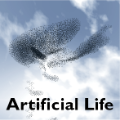One of the main goals of Artificial Life is to research the conditions for the emergence of life, not necessarily as it is, but as it could be. Artificial Chemistries are one of the most important tools for this purpose because they provide us with a basic framework to investigate under which conditions metabolisms capable of reproducing themselves, and ultimately, of evolving, can emerge. While there have been successful attempts at producing examples of emergent self-reproducing metabolisms, the set of rules involved remain too complex to shed much light on the underlying principles at work. In this paper, we hypothesize that the key property needed for self-reproducing metabolisms to emerge is the existence of an auto-catalyzed subset of Turing-complete reactions. We validate this hypothesis with a minimalistic Artificial Chemistry with conservation laws, which is based on a Turing-complete rewriting system called Combinatory Logic. Our experiments show that a single run of this chemistry, starting from a tabula rasa state, discovers -- with no external intervention -- a wide range of emergent structures including ones that self-reproduce in each cycle. All of these structures take the form of recursive algorithms that acquire basic constituents from the environment and decompose them in a process that is remarkably similar to biological metabolisms.
翻译:人工生命的主要目标之一是研究生命出现的条件,不一定如此,但可能如此。人工化学是这方面最重要的工具之一,因为它们为我们提供了一个基本框架,以调查在哪些条件下能够再生、最终可以演变的新陈代谢能够产生自我的新陈代谢,在哪些情况下可以出现。虽然已经成功地尝试了产生新兴自我创造新陈代谢的例子,但所涉及的一套规则仍然过于复杂,无法很好地阐明工作中的基本原则。在本文中,我们假设自我再生新陈代谢所需的关键属性是存在一个自动催化的图灵全面反应的子集。我们用一个最起码的人工化学与保护法的假设来证实这一假设,这个假设以一个称为综合逻辑的图灵系统为基础。我们的实验表明,这种化学的单一过程,从一个塔布拉·里萨国家开始,发现 -- 没有外部干预 -- -- 一种广泛的新陈代谢结构,包括从一个自我催生的新陈代谢的基本结构到每个周期的不断改变的生理结构。





